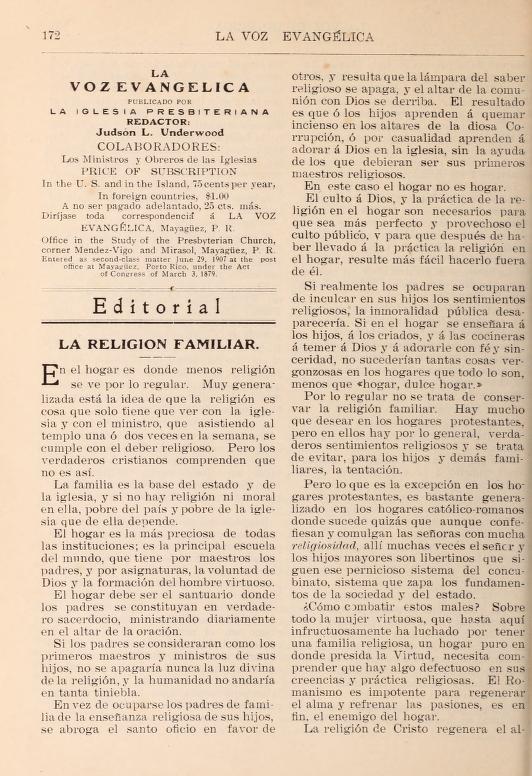
This source, entitled “La Religión Familiar” or “Family Religion” in English was written for the Spanish Presbyterian newspaper La Voz Evangelica by Miguel Martinez. Martinez was a Puerto Rican man who came from a wealthy family. After his conversion, he was one of the first students to attend the Seminario Teologico de Mayagüez when it opened in 1906, and shortly after that, he was appointed as a missionary helper. (Santiago-Vendrell 6). Soon, Martinez became deeply involved in Puerto Rican missionary work and spent much of his time preaching, writing for missionary periodicals, and spreading the gospel (Santiago-Vendrell 6). Martinez was a Puerto Rican, not an American missionary, and this document reflects his perspective as a Puerto Rican citizen who was an early convert to Protestantism. In this article, he argues that religion (specifically Protestantism) should be taught and practiced at home as well as in the church. He makes this point for two main reasons. Firstly, he argues that teaching children about the new religion at home allows Protestantism to spread more quickly and effectively. Secondly, by giving other Puerto Ricans the ability to spread this new religion among themselves, they are maintaining their agency. Additionally, this article was originally published in Spanish, meaning that Martinez was trying to communicate with other Puerto Ricans directly.
This source illustrates how Puerto Ricans were also involved in missionary activity. Martinez is participating in this evangelical mission because he believes in the capability of this new religion to improve the lives of Puerto Rican citizens. It is important here to not belittle the religious belief of Martinez (or his American counterparts), having religious reasoning does not mean that Martinez is an illogical or superstitious person. If we fall into this trap of thinking, we as readers and historians are no better than the missionaries who saw the Puerto Ricans as innately immoral or lazy. Instead, it is important to recognize that Protestantism was an avenue for agency for Puerto Ricans, even if their missionary efforts have favorable consequences for the imperial reach of the United States.
“The home is where less religion is seen regularly. Widespread is the idea that religion is something that only has to do with the church and with the minister, who by going to church once or twice a week fulfills his religious duty. But true Christians understand that this is not the case.
The family is the foundation of the state and of the church, and if there is no religion or morality in it, poor the country and poor the church. Yes, it depends on her. […]
But what is the exception in Protestant homes, is quite generalized in Roman-Catholic homes where perhaps it happens that although the wives confess and receive communion with great religiosity, there many times the master and the older children are libertines. who follow that pernicious system of concubinage, a system that saps the foundations of society and the state.
How to combat these evils? Above all the virtuous woman, who up to now has struggled unsuccessfully to have a religious family, a pure home where Virtue presides, needs to understand that there is something wrong with its religious beliefs and practice. Romanism is powerless to regenerate the soul and curb the passions, that is the enemy of the home
The religion of Christ regenerates the soul, preserves the purity of the family, and forms a protective environment for the home.” (pages 172-173)
Martinez, Manuel. “La Religión Familiar.” Princeton Theological Seminary Library, 1907-1908. https://archive.org/details/lavozevangelica2190igle/page/172/mode/2up
Santiago-Vendrell, Angel. 2021. “Give Them Christ: Native Agency in the Evangelization of Puerto Rico, 1900 to 1917.” Religions 12: 196. https://doi.org/10.3390/ rel12030196